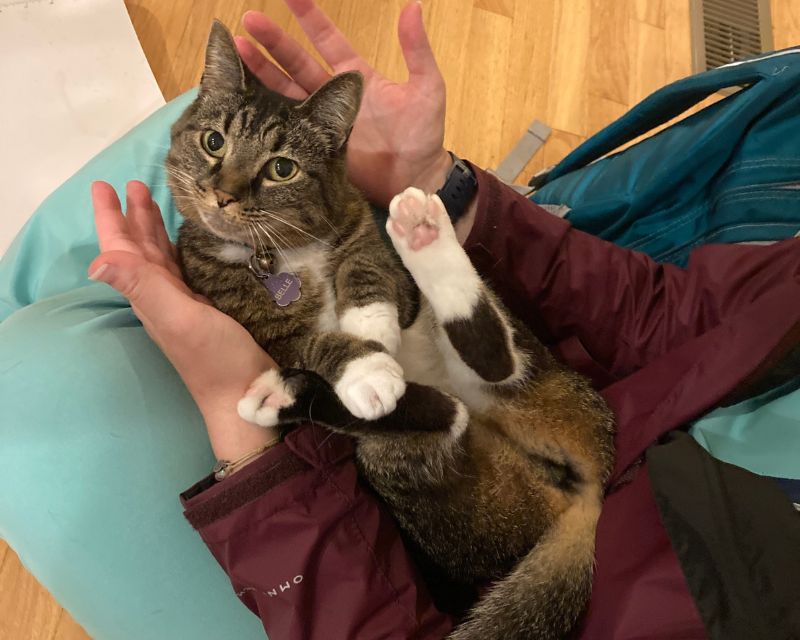- Servicing the Triangle Area: Raleigh, Durham, Chapel Hill, Wake Forest, Cary, and Hillsborough NC
Heartworm Disease In Cats And Dogs

Heartworms are blood borne parasites that are transmitted by mosquitoes. When a mosquito bites an animal it deposits larvae into the host’s bloodstream; over a period of 6-9 months these microscopic worms grow to be up to a foot long and start producing their own larvae inside the dog’s heart. Mosquitos can then bite the infected animal as a reservoir for further spread of the disease. Animals with this disease are often asymptomatic and can live with this disease for years until sudden catastrophic heart failure; this is why screening for this disease is so important.
Dogs are a primary host of heartworms, meaning that they provide an ideal environment for the heartworm to grow and multiply causing damage to the host dog’s lung and heart tissue. Other animals can less commonly become infected with heartworm. Cats do not provide an ideal host for heartworms but heartworms still cause severe damage in cats and even death. There are even a few case reports of humans getting this disease. It takes a minimum of approximately six months from the time a mosquito bites a dog or cat for the heartworm to develop into an adult worm*, this causes a delay in possible diagnosis of infection.
*Check out details on heartworms and their lifecycle at the Companion Animal Parasite Council's (CAPC) website.
Even though we think of mosquitoes as outdoor pests, they do slip inside, and indoor only animals do go outside periodically, sometimes accidentally. Because of this reality, all cats and dogs are at risk of contracting heartworms. In this part of the country, we recommend year round prevention for all cats and dogs.
Symptoms
Many dogs and cats will show no symptoms of disease when initially infected with heartworms. Symptoms of advanced disease include exercise intolerance, coughing, labored breathing, and lethargy. The most common symptom of heartworm disease in cats is sudden death though some will present with asthma like symptoms.
Prevention:
Heartworm prevention stops larvae from developing into mature worms, thus preventing heartworm disease. Preventative medications have no effect on adolescent or adult worms. Missed doses of prevention increases the risk of having older worms in the body that will not respond to prevention.
Most heartworm preventative medications also contain an additional medication for intestinal parasite deworming as well (usually for roundworms and hookworms).
- Dosing: It is important to monitor your pet’s weight. If your pet’s weight fluctuates you may need a different dosage of preventative, so be aware of your pet’s weight and the weight range protected by your chosen preventative. Large dogs sometimes need combined dosing to fully protect them.
- Safety: All products are prescription and approved by the FDA and require a prescription. Collie-breeds with MDR1 mutation are significantly more sensitive to heartworm preventatives (and some other drugs as well) and can experience toxicity at a lower dose than other dogs. However, all FDA-approved heartworm prevention products use doses lower than those known to affect dogs with the MDR1 mutation and have been tested for safety in dogs with the MDR1 mutation. Therefore, these products are considered safe for most dogs if used at the manufacturer’s recommended dose.
Be sure that you are using a high quality protection and following appropriate instructions for your pet.
- For dogs we recommed:
- Simparica Trio: oral heartworm and intestinal parasite/flea/tick treatment/preventative given once every month.
- Heartgard Plus: oral heartworm and intestinal parasite treatment/preventative given once every month. (Don’t forget to give flea & tick prevention too!)
- For cats we recommed:
- Revolution Plus: topical heartworm, flea, tick, mite, and intestinal parasite medication - applied to skin once monthly.
Diagnosis
For Dogs: We recommend annual screening of a small blood sample. The test that we recommend for most dogs screens for the blood parasites heartworm, lyme, ehrlichia, and anaplasma. There are several individual and public health reasons that we recommend this testing annually:
- There is growing resistance to heartworm prevention products in the United States so we need to make sure the product is working the way it should.
- The treatment for heartworm disease is different than giving prevention, so we need to know if this disease is present so we can treat it before it is too late. Heartworm disease typically has no symptoms until there is heart failure present, so early detection is key.
- Product guarantees are forfeited if you do not do annual screening. This may also include treatment covered by pet insurance.
- If your pet is positive and we do not know it, he/she serves as a reservoir for infection to other dogs in your area via mosquitoes
- Exposure to tick-borne illness (ehrlichia, anaplasma, lyme) can happen even if on tick prevention and we recommend treating these diseases if symptomatic.
For Cats: Heartworms develop differently in cats than in dogs and this difference makes detection of heartworms in cats more difficult and requires several different screening tests. It is also important to note that there is NO TREATMENT for cats with heartworm disease; prevention is the only way to combat this disease. We do not routinely screen for heartworm disease in asymptomatic cats because there is no treatment for heartworm in this species, but these tests can always be performed if you are concerned about their exposure.

Treatment:
For Dogs: The approved treatment for heartworm infection in dogs involves six months of exercise restriction, one month of oral medication, three deep, painful muscle injections with an arsenic-derived compound, three days of hospitalization, and can cost upwards of $1000. The treatment also carries the possibility of life-threatening complications. It is much easier and cost effective to prevent the disease than to treat it. It is also important to note that even with successful treatment, the damage that heartworms cause to the heart and lungs can not be reversed. It is a lifelong disease after it is acquired.
For Cats: As mentioned above, there is no approved treatment for heartworm disease in cats at this time. Medications can be given to help control some symptoms of heartworm disease in cats, but prognosis is poor for long term comfort. Prevention is all we have to combat heartworms in cats.
If you have questions about your pet’s health and your pet is an existing patient of Local Mobile Vet, fill out the appointment request form, and we will reach out to get an appointment scheduled. You can also order your pet’s prevention at our online store right now.
If we have never seen your pet before, fill out the New Client Form, and we will reach out to help you determine if we are the right fit for you and your pet.
